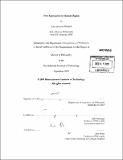| dc.contributor.advisor | Sally Haslanger. | en_US |
| dc.contributor.author | Holland, Sean Jamison | en_US |
| dc.contributor.other | Massachusetts Institute of Technology. Dept. of Linguistics and Philosophy. | en_US |
| dc.date.accessioned | 2010-05-25T20:58:27Z | |
| dc.date.available | 2010-05-25T20:58:27Z | |
| dc.date.copyright | 2009 | en_US |
| dc.date.issued | 2009 | en_US |
| dc.identifier.uri | http://hdl.handle.net/1721.1/55179 | |
| dc.description | Thesis (Ph. D.)--Massachusetts Institute of Technology, Dept. of Linguistics and Philosophy, 2009. | en_US |
| dc.description | Cataloged from PDF version of thesis. | en_US |
| dc.description | Includes bibliographical references (p. 99-100). | en_US |
| dc.description.abstract | Contemporary philosophy of human rights is dominated by two seemingly opposed approaches. This dissertation is concerned with the choice between them. The traditional approach to human rights is characterized by the belief that human rights are moral rights that all human beings possess simply in virtue of their humanity. The political approach to human rights is characterized by the belief that human rights are those rights that possess an essential political function. Each approach faces a unique challenge, and attending to how each challenge is met reveals that the two approaches are more similar than first supposed. However, there remains an important difference between the two approaches regarding the concept of a human right. I argue that the conceptual claim made by the political approach is false. In Chapter One I focus on the traditional approach to human rights. It has an unclear connection to the existing international political discourse and practice of human rights. I call the challenge for the traditional approach the demand of taking the practice seriously. I argue that the traditional account can do so in at least three important ways that demand might be understood. In satisfying this demand, the traditional approach is shown to be in agreement with the political approach in an important way. In Chapter Two I focus on the political approach to human rights. In focusing on the existing political practice of human rights, the political approach can appear overly descriptive in nature. Its challenge is to account for the distinctive moral authority of human rights. | en_US |
| dc.description.abstract | (cont.) I call this challenge the normativity challenge and I argue that the political approach has an effective answer to this concern. However, that answer is indistinguishable from that offered by the traditional approach. Thus, the political approach is shown to be in agreement with the traditional approach in an important way. However, there is an important difference between the two approaches. The political approach ties the concept of a human right to a distinctive political function. The traditional approach rejects this conceptual claim. In Chapter Three I argue that the political approach's conceptual claim is false. | en_US |
| dc.description.statementofresponsibility | by Sean Jamison Holland. | en_US |
| dc.format.extent | 100 p. | en_US |
| dc.language.iso | eng | en_US |
| dc.publisher | Massachusetts Institute of Technology | en_US |
| dc.rights | M.I.T. theses are protected by
copyright. They may be viewed from this source for any purpose, but
reproduction or distribution in any format is prohibited without written
permission. See provided URL for inquiries about permission. | en_US |
| dc.rights.uri | http://dspace.mit.edu/handle/1721.1/7582 | en_US |
| dc.subject | Linguistics and Philosophy. | en_US |
| dc.title | Two approaches to human rights | en_US |
| dc.type | Thesis | en_US |
| dc.description.degree | Ph.D. | en_US |
| dc.contributor.department | Massachusetts Institute of Technology. Department of Linguistics and Philosophy | |
| dc.identifier.oclc | 608229220 | en_US |
